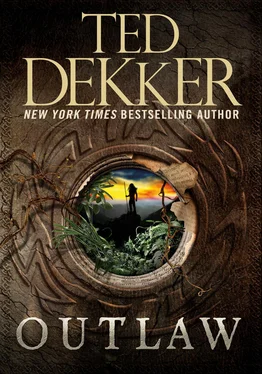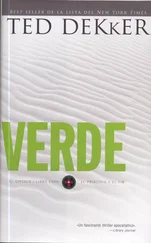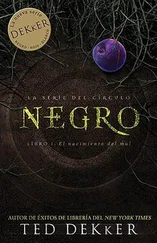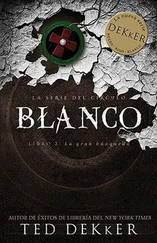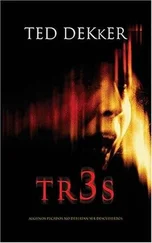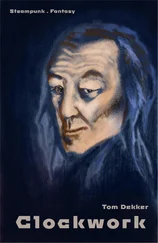When I looked back up, the man was walking toward us with even strides, spear held lightly in his hand. No other weapons, no body paint or adornments, just that one spear made of wood and bone.
The air seemed to still. Even the birdcalls stopped. I couldn’t know whether the princes saw the man as a threat or whether this was Isaka, their chief, but there could be no doubt that he commanded a respect they dared not challenge.
The man walked toward us in no hurry, eyes not on the two princes but on me. My heart hammered and I found myself wondering if he’d come to execute me.
But as he drew within ten paces, I saw that he didn’t have the eyes of a killer. His were a deep brown and brimming with mystery. I found myself immediately put at ease.
When I looked up at Wilam and Kirutu, my hope surged. They were clearly uncomfortable. Which meant the stranger held some power over them, and any man with such an understanding gaze might be a benefactor.
Beside me Lela was trembling. Not Isaka, then, I thought. She’d spoken of the chief with pride, not fear.
The man stopped five feet from me and for a minute he searched my eyes. He shifted his gaze first to Wilam and then to Kirutu.
He stepped up to the prince of the Warik. Slowly lifted his right hand and laid his fingers on the man’s scar. He slid his hand up, tracing the scar, tsk ing softly.
His back was to me so I couldn’t see his face, but I watched Kirutu’s reaction. Saw the bitterness in his dark eyes. The trembling in his fingers.
The man’s hand left Kirutu’s chest and rose to his face. Followed the lines of the prince’s cheek to the back of his head. The stranger’s strong hands gripped Kirutu’s neck and pulled his head forward so that they were cheek to cheek.
He whispered something into Kirutu’s ear and I watched the prince’s face quiver as if he was resisting and terrified at once.
The man slowly drew back from Kirutu, gave him a barely perceptible nod, and, without ceremony, turned from us and walked back the way he’d come, in no hurry.
I watched him go, stunned by the strange exchange, struck by how little I understood of what was happening in this mysterious dark valley.
Only then did I see the silhouette of a lone figure behind Kirutu on the slope. I couldn’t mistake the man coated in black. The shaman I’d seen at the council, Sawim. The one who’d struck such fear into my soul.
Two shamans? If so, they were not of the same character.
The black one , Lela had called him.
The fur-clothed stranger paid him no mind. He simply walked away as if he had no care in the world.
When I looked back to where Sawim stood, he’d already turned and was walking away, beyond the hill’s crest.
Michael had said there was a war brewing in the valley, but it was a contest for more than Isaka’s throne, I thought. There was a deeper struggle at hand—one that stirred the same unspoken cry to God that I had been uttering since waking in the bottom of that canoe.
Save me. Please, I beg you. Save me!
A cry that he had not yet heard. If he was even listening.
“So be it,” Kirutu said.
He turned his back on us and walked south with his guards.
“So be it,” Wilam said. He nodded at his guards and headed west, toward the Impirum village.
Two of the men who’d remained by his side hauled Lela and me to our feet. Shoved us down the path.
“Who was that?” I asked, hurrying to keep pace. “What’s happening?”
“This Kugi,” she said. “Evil spirit man.”
“A shaman?”
“More maybe.”
But her face was lit with hope.
“We’re free?” I asked, hurrying to keep pace.
“No, miss,” Lela said. “This Wilam our master now. But we not die, I think.”
I prayed that she was right. That whereas Kirutu had not been able to hold me captive, Wilam would now show the whole valley that he could.
He’d kept me to spite Kirutu publicly. Kirutu had just as publicly called for my death. What this Kugi had said to Kirutu, I didn’t know, but I wouldn’t argue with the outcome.
A new hope swept through my mind.
And then I remembered where I was.
I remembered the people I was with—the nakedness of their bodies, the savagery of their ways.
I remembered that I was still in hell, and my heart sank.
Chapter Eleven
I LEARNED that night who the stranger was, and my confusion deepened. Not because of what Lela shared with me, but because of what she didn’t.
They called him Kugi Meli , which means “evil spirit,” a name they gave to many things of a spiritual nature, I learned. The man had appeared from the mountains two years earlier and walked into the chief’s hut without being seen by the guard. He’d told Isaka that he would be dead in less than three years’ time. The valley would embrace a new king who would tear down all that was sacred. And then he’d left.
Filled with fear, the Tulim had immediately set out to kill him, but the man had proven impossible to track down. Why? Because he was an evil spirit—there was no other explanation.
Word spread that killing the man would anger the evil spirits. The man was untouchable. No one knew where he lived or came from. After that he was seen every few moons, usually at a distance, watching. Then vanishing. Like a ghost.
“What about the shaman?” I asked.
“Sawim,” she whispered. It was clear that she wasn’t comfortable speaking of these matters.
“Is Sawim evil as well?”
She grabbed my arm, eyes wide. “No, miss! You must not say this evil!”
“They are enemies?”
“This is not for me to say. These prince very afraid of both.”
It was all she offered me. Neither of us had any idea what words the stranger had spoken to shift Kirutu’s position, convincing him to leave me with Wilam, unharmed.
I set aside my attempt to understand their myths. Of more importance was my new status among the Tulim.
I was to be a free woman.
Truly my guard—Momos, the same lanky man who’d watched over me earlier—was only there to ensure my safety, knowing that I was at risk of being taken captive by any of Kirutu’s more ambitious warriors. The Impirum placed no restrictions on where I might go or whom I might talk to, excepting their Kabalan, which was reserved strictly for the muhan , or lords, as Lela called the class connected to the chief and his bloodline.
But when I was set free to live among the Tulim, the reality of my situation rose up and swallowed me whole. My eyes were opened to the terrifying prospect of actually living among them.
It began that first night of freedom, when Lela took me by the hand and excitedly led me to her hut. “Come see, you live with me!” As darkness claimed the jungle, we wound our way to the south side where the lowest and poorest lived.
I could understand Lela’s excitement as she stepped into her home—she was proud of her dwelling, and even prouder to have proven so useful to me and her prince. But when I stood up in the hut I saw only darkness. The fire was out, the air smelled like smoke and mildewed dishrags, and I felt desperately alone.
Lela was already on her knees, bending over the fire pit, blowing at the coals still smoldering there. With a few splinters and some dried bark she coaxed up flame, then heaped up some wood.
“We are very good, miss! It is very special.”
I stood by the door, at a loss, consumed by a simple question that had not presented itself to me until that moment.
Now what?
Enslaved in a hut awaiting execution was one thing, but living freely in a smoky hut with only straw for a floor and charred poles with cracks for walls…
It was not me.
Читать дальше
